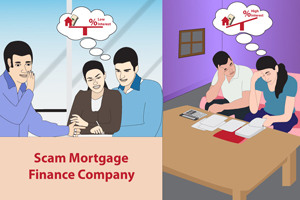Mortgage Scams
Businessmen and individuals who regularly conduct numerous financial transactions through banking portals must enter their user ID and passwords. While these transactions typically occur smoothly and securely, there have been instances where scammers gain unauthorized access to computers through fraudulent methods, stealing important data and swindling money instantly. Scammers and hackers employ sophisticated tactics to extract personal and financial details from the public, stealing their wealth without the knowledge of the account holders. These fraudulent actors operate predominantly in online spaces, using deceptive strategies to infiltrate financial systems.
Businessmen and individuals who are making innumerable financial transactions regularly through banking portals are compelled to punch in their user ID and passwords. Though these transactions happen perfectly and properly every day, there are instances where scammers steal this important data by gaining entry into the computer through fraudulent means and swindle money in a flash of a second. Scammers and hackers use intelligent tactics and tricks to extract the personal and financial details of the public and steal their wealth without the knowledge of the account holders. These scammers act predominantly on the internet and, to a lesser extent, follow other traditional methods.
Scams related to mortgage and loans have increased tremendously in recent years, and perpetrators have engaged in various criminal activities in this area. Scammers pose as leading home financiers or reputed money lenders, making fake calls to hundreds of people in need of home or mortgage loans. They convincingly lure innocent people, collect personal information, and leave the victims in financial distress. Scammers also disguise themselves as reputable brokers, making phone calls to several individuals. Some people in urgent need of money may develop a cordial relationship with these scammers and unknowingly transfer their sale deeds or lose their money.
Mortgage scams are deceptive practices that exploit individuals involved in real estate transactions, often leading to financial loss and legal complications. Common types of mortgage scams include foreclosure rescue scams, where fraudsters target homeowners facing foreclosure, promising to save their homes in exchange for upfront fees or property title transfers. Loan modification scams involve posing as companies offering to renegotiate mortgage terms but charging upfront fees for little or no assistance. Equity stripping occurs when scammers convince homeowners to take out excessive loans, vanishing with the borrowed funds. Phantom help schemes charge distressed homeowners for services that legitimate counseling agencies provide for free.
Deed theft involves forging signatures or using deceptive tactics to transfer a homeowner's property title, resulting in the loss of ownership. Fake real estate professionals may impersonate agents, offering fake services, charging fees, or providing misleading information. Bait-and-switch tactics involve presenting one set of loan terms initially but changing them at closing, leaving borrowers with unexpected and unfavorable conditions.
To protect against mortgage scams, individuals should verify the legitimacy of companies, carefully read and understand all documents before signing, be skeptical of upfront fees for mortgage assistance, choose reputable lenders, and seek professional advice when needed. Staying informed and cautious throughout the mortgage process is crucial in preventing falling victim to scams that can have long-lasting consequences on individuals and their financial well-being.

Scams with respect to mortgage protection insurance are worth reading. Generally, insurance companies offer mortgage protection insurance to the borrower of the loan at the time of taking the loan, and when the borrower dies, the insurance company will settle the outstanding loan amount with the lender. Scammers disguise themselves as insurance representatives and send hundreds of emails to targeted individuals, stating: "We are one of the leading insurance companies in the country and offer free insurance cover for your property. To finalize the deal, you are requested to deposit a nominal fee for processing the insurance." These emails appear extremely official and appealing. If anyone responds and pays the deposit amount, these criminals will immediately run away with the money, leaving no trace.
Scams related to mortgage help or relief are also worth reading. Several scammers were arrested in the USA in 2011 and jailed after posing as Home Owners' Protection Economic Inc. (HOPE Community). These criminals acted as agents of a home loan modification department from HOPE and cheated several people by charging upfront fees. However, they were actually mimicking HOPE NOW, a public-private alliance of lenders and similar participants.
The public should immediately report these types of scams to the cyber cell to help others exercise caution when receiving such calls or emails from fraudsters.
Homeowners or individuals planning to take out home loans should follow these guidelines:
- Never provide personal and financial details to strangers. If an email seems official, consult senior financiers or reputable counselors nearby to verify authenticity and resolve concerns.
- Report such scams to the cyber cell and relevant government authorities.
- Never reply to emails from scammers or fraudsters.
- Avoid building any rapport with unknown individuals or third parties.
- Verify the background and reputation of any organization before proceeding.









